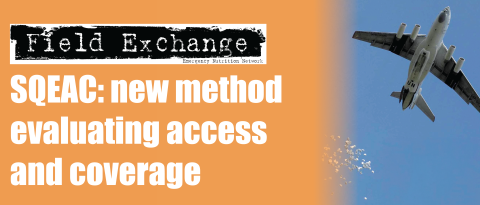Review of CMAM in Ethiopia, Malawi and Niger
Summary of research1

Waiting area in CMAM programme in Maradi, Niger
USAID requested FANTA to conduct a review of the integration of community- based management of acute malnutrition (CMAM) into the national health systems of Ethiopia, Malawi and Niger. The review is located within a context of growing recognition of the importance of employing more sustainable approaches through existing health system infrastructure, to ensure services continue as emergencies subside and organisations, and their resource flows, diminish.
The objectives of the CMAM country review were to:
- Assess integration of CMAM into national health systems.
- Document challenges of integration and lessons learned and identify factors influencing integration.
- Provide recommendations for improved integration and guidance for Office for Disaster Assistance (OFDA) proposal guidelines and partner selection.
To meet these objectives, FANTA organised visits to Ethiopia, Malawi and Niger between April and June 2007. The review involved document reviews, field visits with direct observation of CMAM services, semi-structured interviews with key informants at national, regional, district and community levels, and discussions with health system staff, community health workers, community volunteers, beneficiaries and non-beneficiaries.
The review found a number of similarities and differences between the three country experiences. Similarities included start-up and scale-up of CMAM services during crises, weak health systems with poor access and low coverage of services, dependence on donor support for supplies, and the presence of numerous stakeholders with fragmented referral and treatment networks. Differences in integration revolved around the extent of Ministry of Health (MoH), UNICEF and international nongovernmental organisations (INGO) leadership and coordination, and on varying strategies for transferring responsibility for CMAM to MoHs. The review identified five key elements for successful integration that should be considered by MoHs, NGOs and donors that are designing, implementing or coordinating CMAM programmes:
- The enabling environment for CMAM demonstrates the importance of MoH technical leadership and coordination. A support unit to the MoH for technical guidance on CMAM is helpful for capacity development at national policy and district implementation levels. National guidelines serve as an important policy tool and lead to better harmonisation of CMAM services. Over the long term, commitment by donors to develop and maintain capacities is needed, along with planning for future emergencies and for transition of services post-emergency.
- Access to CMAM services should be assured in priority districts following initial start-up in learning sites and gradual scale-up. Both inpatient and outpatient care needs to be made available by linking with a community-based network of formal and informal healthcare and community systems.
- Access to CMAM supplies should be ensured during and after emergencies. While beyond the means of most developing country budgets, it is critical that CMAM supplies of essential drugs and therapeutic foods be secured by MoHs. Long-term donor commitment to provide supplies is necessary.
- Quality of CMAM services can be assured through adherence to national CMAM guidelines, support to and supervision of CMAM services, and harmonised monitoring and evaluation tools that are linked to the national health information system.
- CMAM competencies can be strengthened through integrating pre-and in-service training for CMAM into national curricula for all levels of health care providers (community health workers, nurses, and physicians). Training should be augmented through practical learning experiences at CMAM learning sites, post-training on site mentoring support and supervision, and regular experience sharing at meetings and other fora.

A child attending a CMAM programme in Malawi
The importance of a health systems approach - during service introduction, expansion or transition from emergency to development contexts - is especially important to ensure that CMAM is integrated into the national health system, while not supplanting other essential services. Accordingly, tools to improve assessment, design, monitoring and evaluation of the introduction and scale up of CMAM services are needed.
In countries with a high burden of acute malnutrition, national health policies will have to carefully assess the need for and situate CMAM within other essential health care and nutrition services. National health policies will have to identify context-specific strategies on how best to address high levels of acute malnutrition. CMAM services may be prioritised in certain highly vulnerable areas with a chronic burden of acute malnutrition, in emergencyprone areas, and/or as a nationwide service.
Global-level recommendations include:
- Advocate and attract technical and financial support from donors to integrate CMAM into national health policies and strategic plans.
- Support country initiatives to invest in the key elements identified for successful integration and sustainability of CMAM.
- Invest in developing tools for improving assessment, design, monitoring and evaluation of CMAM.
- Update donor project proposal guidelines for CMAM programming and include guidance based on the key elements for improved integration identified in the review.
- Broaden the base of NGOs providing CMAM support and include grantees that are in best position to address key elements for integration and scaling up of CMAM through their expertise in strengthening health systems.
The review also identified the need to document in greater detail successful integration experiences, specifically examining the process and context of integrated service introduction and scale-up. In addition, evidence of integrated CMAM services and comparisons of these experiences to those of other integrated services, such as Integrated Management of Childhood Illness, is also important to document. Finally, the various approaches and strategies employed by NGOs and MoHs globally for CMAM service provision should continue to be documented and shared through various channels, including workshops, databases and publications.
1Review of CMAM in Post-Emergency Context: Synthesis of Lessons in Integration of CMAM into National Health Systems. Available to download at: http://www.fantaproject.org/publications/ethiopia_2007.shtml
Imported from FEX website


